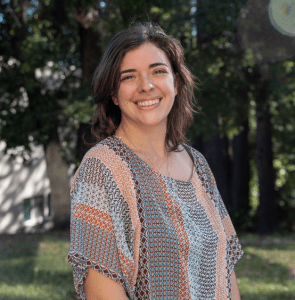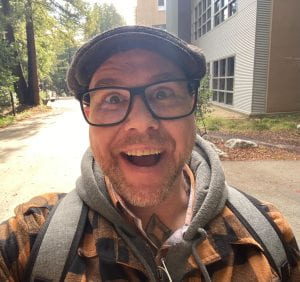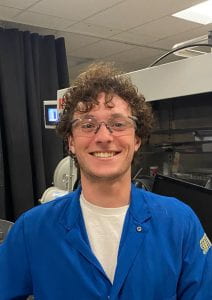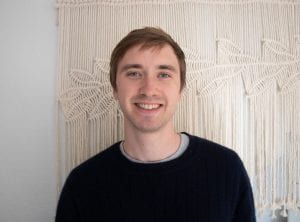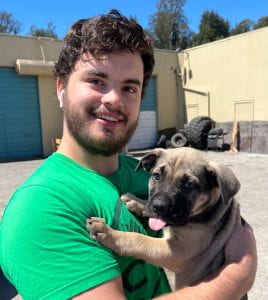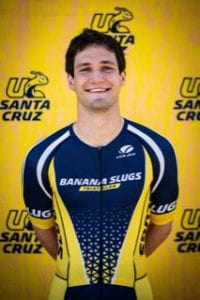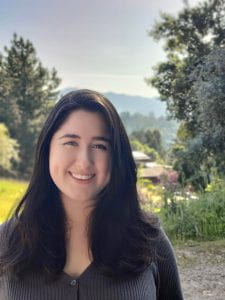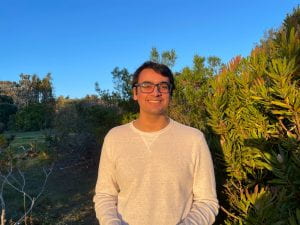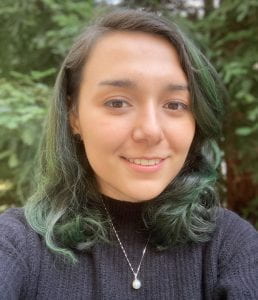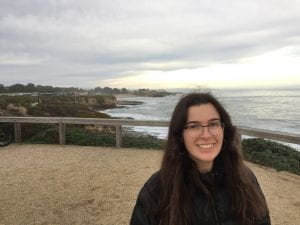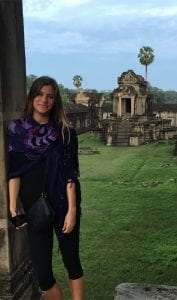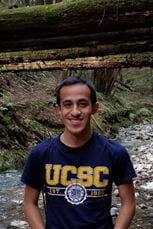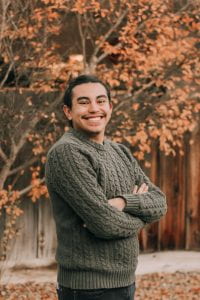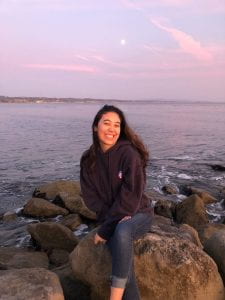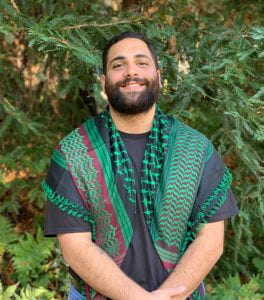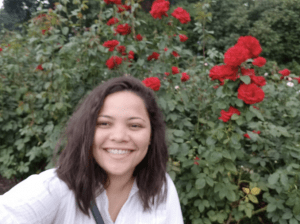Chemistry & Biochemistry Advising Resources
Department: Chemistry & Biochemistry
Email: chemistryadvising@ucsc.edu
This page is meant to provide resources to assist you in planning your degree progress.
Chemistry & Biochemistry Advising
Advising Email: chemistryadvising@ucsc.edu
Most advising questions can be answered via email! Please follow the guidelines below when emailing the Chemistry Advisor:
- Use the chemistry advising email above, NOT the personal emails of Chemistry & Biochemistry advisors.
- Include your full name and student ID number.
- If you are requesting assistance with forms, please attach a copy of your form to the email.
The Lead Advisor for the Chemistry & Biochemistry Department is Marla Hesselink.
Marla advises for proposed Chemistry students, declared Chemistry B.A. & B.S. students, declared Biochemistry & Molecular Biology (BMB) B.S. students, and Chemistry minor students.
Make a Chemistry/Biochemistry Advising Appointment with Marla here.
Please include a short description of what you want to discuss at the appointment when you schedule, so Marla may prepare for your meeting.
Aron Carlton advises proposed Biochemistry & Molecular Biology (BMB) B.S. students.
Proposed BMB students can make a BMB proposed Advising Appointment with Aron here.
Please include a short description of what you want to discuss at the appointment when you schedule, so Aron may prepare for your meeting.
Instructions for how to make appointments using Slug Success.
The Department of Chemistry & Biochemistry redesigned the General Chemistry lecture & lab series and it went live in Fall 2023.
Check out the General Chemistry Redesign Student Enrollment Guide to learn more about what General Chemistry course(s) you should enroll in during 2023-24, when the different series/courses are planned to be offered, etc.
If you started in the CHEM 1 series and the General Chemistry course(s) are required for your major or minor, it is strongly recommended that you check in with your major or minor advisor before enrolling in CHEM 3 courses to ensure you are completing the correct coursework.
Qualifying for the Advanced General Chemistry series
NOTE: CHEM 4 is not offered in 2024-25.
CHEM 4 is an accelerated two-quarter series intended for students who enter UC Santa Cruz with excellent preparation in high school chemistry. Students in this series will learn fundamental concepts in chemistry at a faster pace than our traditional general chemistry series (CHEM 1 or CHEM 3), with emphasis on quantum theory, molecular structure, and chemical driving forces. Students with an exceptionally strong background in high school chemistry are especially encouraged to begin with CHEM 4A (Advanced General Chemistry: Molecular Structure and Reactivity) instead of CHEM 3A.
All students who want to enroll in the accelerated series must complete an online learning module and assessment administered by the Chemistry and Biochemistry Department, regardless of high school AP scores. Once the online learning module and assessment is started (by completing the initial knowledge check), students may request enrollment in CHEM 4A and then will have six weeks to complete the online learning module and assessment. Students who complete the online learning module and assessment and submit their proof of completion by the established deadline are eligible to remain enrolled in CHEM 4A. Students who want to enroll in CHEM 4A in Fall '23 can access the full CHEM 4A qualification instructions and the online learning module by joining this Canvas Class.
If you have questions about this process, please contact a Chemistry and Biochemistry Department advisor at chemistryadvising@ucsc.edu.
Getting Started Guides
Getting started in the Chemistry major as a first-year student
Getting started in the Chemistry major as a transfer student
Getting started in the Biochemistry & Molecular Biology (BMB) major as a first-year student
Getting started in the Biochemistry & Molecular Biology (BMB) major as a transfer student
Students intending to transfer into UCSC to pursue a Chemistry or Biochemistry degree should review the Transfer Information and Policy section of the catalog for the Chemistry or Biochemistry degree of interest:
- Chemistry B.A. Transfer Information and Policy
- Chemistry B.S. Transfer Information and Policy
- Biochemistry & Molecular Biology (BMB) B.S. Transfer Information and Policy
Students can also review the getting started in the major as a transfer student guide for their major of choice:
- Getting started in the Chemistry major as a transfer student
- Getting started in the Biochemistry & Molecular Biology (BMB) major as a transfer student
Students preparing to transfer from a California Community College should also reference assist.org to determine what UCSC coursework they may receive transfer credit for.
General information on transfer credit (including how to have it sent to UCSC) can be found here. NOTE: Unit Credit and satisfaction of GE requirements are processed through admissions. Please see the UCSC advising website for more information.
Students preparing to transfer from another University or an out-of-state Community College can request Chemistry & Biochemistry major/minor course credit for courses completed at their original institution via the Transfer Credit Articulation Request form.
Chemistry and Biochemistry majors must complete a certain set of courses to complete their degree. Those degree requirement courses are listed in the catalog for each major.
Degree requirements & Sample Academic Plans for Chemistry B.A.
Degree requirements & Sample Academic Plans for Chemistry B.S.
Degree requirements & Sample Academic Plans for Chemistry B.S. with Biochemistry Concentration
Degree requirements & planner for the Biochemistry & Molecular Biology (BMB) B.S.
Senior exit requirements for the Biochemistry & Molecular Biology (BMB) B.S.
Course Plan 2024-25 – the Course Plan on the Chemistry Undergraduate Programs webpage shows in the planned offerings for all Chemistry (CHEM) & Biochemistry (BIOC) courses this academic year. Course syllabi can also be found there.
Academic Planning Form Templates
Below are links to academic planning form templates you may use to independently create an academic plan and track your progress over time. It is highly recommended that students share and review their academic plan with Chemistry & Biochemistry Advising to ensure accuracy and completeness.
Important notes about using academic planning form templates:
- You will need to be logged in to your @ucsc.edu Google account in order to access these forms.
- Make sure to click on BOTH TABS at the bottom of the planning documents to view:
- A form that can be used to plan out coursework quarter-by-quarter
- A checklist of the course requirements to complete the degree or minor
- The drop-down menus within the academic plan tabs have ALL the CHEM/BIOC major requirement courses (but not all are necessarily for your major-of-choice specifically).
- using the drop down menus while academic planning allows you to easily view in what quarters courses are offered:
- (F) stands for “Fall”, (W) stands for “Winter”, (S) stands for “Spring”
- If there are no parenthesis next to the course (i.e.: CHEM 1A), then the course is offered every quarter (except perhaps summer).
- Students should check the “Summer Steadies” webpage to see what courses are guaranteed to be offered each summer.
- Students should also be aware that upper division courses are not often offered in the summer.
- using the drop down menus while academic planning allows you to easily view in what quarters courses are offered:
- Not sure where you stand in major qualification? Use the Qualification GPA Calculator tab!
- You should ALWAYS share your academic plan with chemistryadvising@ucsc.edu — they can help you ensure the accuracy of the plan & that other advisors can access it as needed.
Make a copy of the Chemistry B.A. Academic Planning Form
Make a copy of the Chemistry B.S. Academic Planning Form
Make a copy of the Chemistry B.S. with Biochemistry Concentration Academic Planning Form
Make a copy of the Biochemistry & Molecular Biology (BMB) B.S. Academic Planning Form
Enrollment Updates
Updated 5/24/2024
Summer 2024 Enrollment Updates
- Check out the Summer Session website for details about how to enroll as a UCSC student, visiting student, returning student, financial aid details, etc.
- Enrollment deadlines, Add/Drop/Swap deadlines, etc. can be found on the Summer Academic Calendar webpage.
- All permission numbers for courses in the summer are handled by the Summer Session office. The Department of Chemistry & Biochemistry cannot provide permission numbers for Chemistry courses offered in the summer.
- Permission numbers are necessary to enroll in for Session 2 courses if the prerequisite is being taken in Session 1.
- Students can reach the Summer Session enrollment team to request a permission number via email at: summer@ucsc.edu
- Did you start in CHEM 1 and need to complete General Chemistry? All of the General Chemistry courses are being offered this summer!
- If you need an “equivalent” course to CHEM 1A, email summer@ucsc.edu to request a permission number for CHEM 3B
- If you need an “equivalent” course to CHEM 1B, email summer@ucsc.edu to request a permission number for CHEM 3A.
- If you need an “equivalent” course to CHEM 1C, email summer@ucsc.edu to request a permission number for CHEM 3C.
- If you need an “equivalent” course to CHEM 1M, email summer@ucsc.edu to request a permission number for CHEM 3BL.
- If you need an “equivalent” course to CHEM 1N, email summer@ucsc.edu to request a permission number for CHEM 3CL.
- Students are encouraged to enroll by June 1 to ensure that Financial Aid is disbursed in time.
- If a student has participated in more than 60% of a course, the recommendation is to change the grade option to P/NP instead of a letter grade. This will help you keep your summer financial aid. It’s not recommended to withdraw, as you will likely lose financial aid that you were awarded.
Fall 2024 (and beyond) Enrollment Updates
- Click here to request a permission number for a Chemistry or Biochemistry course (EXCEPT BIOC 100A – see below for BIOC 100A requests). Be sure to read more about closed classes and waitlists in this section and in the “General Enrollment Information” section of this website, as well.
- Are you a non-Chemistry, Biochemistry, or Biomolecular Engineering and Bioinformatics major who wants to take BIOC 100A? Request enrollment in BIOC 100A with this form.
- CHEM 4 is not being offered in 2024-25.
- Do you want to enroll in a fall Chemistry or Biochemistry class, but you’re enrolled in its prerequisite at a community college, or elsewhere, over the summer?
- Submit a permission number request for the course you want to enroll in this fall once you enroll in the prerequisite course elsewhere and send some sort of proof of enrollment in the prerequisite course to chemistryadvising@ucsc.edu
- Once your grade for the prerequisite course elsewhere comes in, you are required to send an official transcript to UCSC as soon as possible so it can be reviewed for official transfer credit processing AND send an unofficial transcript or grade report showing those grades to chemistryadvising@ucsc.edu.
- If you do not send an unofficial transcript or grade report to chemistryadvising@ucsc.edu by the first day of classes in the fall, you will be dropped from the fall course you received a permission number for.
- Did you start in CHEM 1 and need to complete General Chemistry?
- We are offering CHEM 3A, CHEM 3C, and CHEM 3CL in fall ’24.
- If you need an “equivalent” course to CHEM 1B, request a permission number for CHEM 3A.
- If you need an “equivalent” course to CHEM 1C, request a permission number for CHEM 3C.
- If you need an “equivalent” course to CHEM 1N, request a permission number for CHEM 3CL.
- CHEM 3A, CHEM 3B, & CHEM 3BL are planned to be offered in winter ’25.
- If you need an “equivalent” course to CHEM 1A, request a permission number for CHEM 3B when winter enrollment is approaching.
- If you need an “equivalent” course to CHEM 1B, request a permission number for CHEM 3A when winter enrollment is approaching.
- If you need an “equivalent” course to CHEM 1M, request a permission number for CHEM 3BL when winter enrollment is approaching.
- Check in with your major advisor if you’re unsure what General Chemistry course you need or when you should plan to take it.
- We are offering CHEM 3A, CHEM 3C, and CHEM 3CL in fall ’24.
- CLASS CLOSED/FULL?:
- CHEM 3A – is full as of 5/24/24 at 120 students. We cannot open more seats, as we must save seats for incoming fall ’24 frosh who need 3A in their first quarter to get started in their majors. Please waitlist during second pass enrollment!
- FIRST PASS ENROLLMENT: The Department of Chemistry & Biochemistry monitors enrollment numbers throughout the enrollment period and adjusts capacities as possible/necessary. If a Chemistry or Biochemistry course’s sections are full but the total course enrollment has not been met, it is likely that more space in the sections will open up and students should check back frequently during their enrollment appointment if they need to get into that course.
- SECOND PASS ENROLLMENT: During and after second pass, the Department of Chemistry & Biochemistry uses waitlists to gauge the demand for additional seats. When Chemistry or Biochemistry classes are full during second pass, students should enroll on the waitlist (waitlists open during second pass enrollment), especially if the sections are full but the total course enrollment has not been met. Students should also keep an eye on other sections that they have not waitlisted for, in case space opens in a section that wasn’t chosen for the waitlist but works for their schedule.
- All students who have met the prerequisites or enrollment restrictions for a CHEM or BIOC class that is full should waitlist for the class. Completing the permission number request form will NOT get you a permission number to override a full course and does NOT allow you to bypass the waitlist.
- CHEM 3B/CHEM 3BL waitlisting: If the courses fill, students should enroll on the waitlist for CHEM 3BL ONLY (do not also enroll in CHEM 3B). Once a seat is secured in CHEM 3BL, the student must also enroll in CHEM 3B (unless CHEM 1A was already completed and the student is finishing the General Chemistry series by enrolling in CHEM 3BL – the “new CHEM 1M”).
- CHEM 3C/CHEM 3CL waitlisting: If the courses fill, students should enroll on the waitlist for CHEM 3CL ONLY (do not also enroll in CHEM 3C). Once a seat is secured in CHEM 3CL, the student must also enroll in CHEM 3C.
- Learn more about waitlists & waitlist strategy in the “Waitlist” General Enrollment Information section below (scroll down!).
- All students who have met the prerequisites or enrollment restrictions for a CHEM or BIOC class that is full should waitlist for the class. Completing the permission number request form will NOT get you a permission number to override a full course and does NOT allow you to bypass the waitlist.
For enrollment information/procedures/updates on BIOL courses, visit the MCD enrollment website.
- For those who want to take a course with BIOL 102J as a prerequisite: BIOL 102J is “equivalent” to BIOL 20L and 102J has been discontinued – so students will not be penalized at all for not completing 102J.
For enrollment information/procedures/updates on PHYS courses, visit the Physics enrollment website.
For updates on courses sponsored by other departments (non CHEM/BIOC courses), please visit the appropriate department websites.
General Enrollment Information
General Enrollment Information from the Registrar (enrollment appointments, waitlists, min/max credits, etc.)
Enrollment How-To Videos
General Chemistry
See the “General Chemistry Courses” section of this Chemistry & Biochemistry Advising website.
Lab Attendance and “Crashing”
Enrolled students who do not attend their first lab meeting will be dropped. Attendance will be taken in the first 10 minutes; students not present when roll is taken will be dropped from the lab and their space in the course will be given to those on the waitlist.
General Chemistry labs are offered every quarter. Although it is recommended to take the General Chemistry lecture & associated lab concurrently, students have the option of delaying the lab for a future quarter if the lab sections are full.
“Crashing” lab sections: In the case of all Chemistry labs, “crashing” is not an option, even if you are on the waitlist for the lab. Only enrolled students (not including waitlist) may attend the first lab.
Waitlists
All Chemistry courses will have a waitlist. Do not contact the instructor asking for a permission code to get you off the waitlist.
- Waitlists will be available at the start of Second Pass enrollment: Log in to MyUCSC to view your waitlist appointment time. For your best chance at becoming enrolled, add or swap onto a waitlist as soon as they become available.
- Students should watch this How-To Waitlist video provided by the Orientation Office to learn more about the ins-and-outs of enrolling on a waitlist at UCSC.
- All waitlists will be set to auto-enroll unless otherwise noted: Students will be automatically enrolled as space becomes available in the course and notified via email.
- Waitlists will manage enrollment: If you want to enroll in a full course, you MUST enroll onto the waitlist. To allow for fair access to enrollment, individual requests to instructors or the department will not be entertained.
- The waitlist period is from the end of the last day of enrollment to the eighth day of instruction. On the eighth day all waitlists are purged. Students who want to get into a course after this point must have a permission code to enroll. The reason for this is because students who have not attended a course prior to the eighth day fall behind on course content. Only the instructor can decide if a student will be successful in a course with late enrollment.
- After the eighth day of instruction, students need to use the Chemistry/Biochemistry Permission Number Request Form to request a permission number for a Chemistry or Biochemistry course.
Chemistry Lab Waitlists
- CHEM 8L is the lab associated with CHEM 8A. CHEM 8M is the lab associated with CHEM 8B.
- Gen Chem Labs (1M and 1N) do not have a lab lecture. O Chem labs (8L and 8M) do – held once a week.
- O Chem Labs (8L and 8M): All students enrolled, waitlisted, or seeking a seat in a lab MUST attend the first class lecture meeting (lab lecture – NOT the lab itself) which is noted in the schedule of classes.
- “Crashing” lab sections: In the case of all Chemistry labs, “crashing” is not an option, even if you are on the waitlist for the lab. Only enrolled students (not including waitlist) may attend the first lab. If you are on the waitlist, you must wait for confirmation notification by the Registrar’s Office regarding your official enrollment in a lab section prior to attending the lab section.
Independent Study
Students may earn academic credit for independent research in a lab. If you want to enroll in an independent study course number for enrollment for Lab Research, you must complete a Petition for Undergraduate Individual Studies form. You must have an informal agreement in place with the Professor/Faculty Sponsor prior to completing this form. Please read the “Undergraduate Research” section of this advising webpage for more details.
Major Qualification
Students must complete a certain set of coursework and achieve a certain GPA in order to qualify for a Chemistry major.
Qualification courses and GPA requirements for the Chemistry B.A.
Qualification courses and GPA requirements for the Chemistry B.S.
Qualification courses and GPA requirements for the Biochemistry and Molecular Biology (BMB) B.S.
Major Declaration Timeline
The major declaration deadlines for each quarter can be found in the academic calendar.
Students who entered UC Santa Cruz as first-year students are required to formally declare a major by the deadline in their sixth quarter on campus.
Students who transfer to UC Santa Cruz are required to declare a major by the deadline in their second quarter on campus.
Major Declaration Process
Students should petition to declare a Chemistry or Biochemistry major once they’ve…
- completed all qualification courses and met the GPA requirements;
- have an official, signed, department-approved academic plan on file;
- met or communicated with Chemistry & Biochemistry Advising regarding their academic plan.
Students may log into MyUCSC and submit the Petition for Major/Minor via MyUCSC to petition to declare a Chemistry major as soon as they have met major qualification requirements and/or reach their declaration deadline quarter, whichever comes first. The Petition for Major/Minor declaration form can be accessed by going to MyUCSC and navigating to the Student Homepage and selecting the Undergraduate Student eForms tile > Petition for Major/Minor.
For assistance, please contact Chemistry & Biochemistry Advising at chemistryadvising@ucsc.edu.
Major Declaration Appeals
Students may appeal to the major either prior to or after submitting a petition to declare and being denied (in the latter case, appeals must be submitted within 15 days from the date the denial notification was sent). Within 15 days of receipt of the appeal being submitted, the department will notify the student and their affiliated college of the decision.
To appeal to declare a Chemistry major (Chemistry B.A., Chemistry B.S., or Chemistry B.S. with Biochemistry Concentration), complete the Chemistry Major Appeal form via DocuSign.
To appeal to declare the Biochemistry & Molecular Biology (BMB) B.S. major, complete the Biochemistry & Molecular Biology Major Appeal form via DocuSign.
To complete the major appeal form, you will need:
- An official Academic Plan (signed by the Chemistry/Biochemistry major advisor)
- Unofficial Transcripts
- An Appeal Letter
Additional instructions can be found in the appropriate form.
Please note that the information you share in your appeal or with your advisors will be kept confidential and shared only with campus officials as required to serve you in an advising capacity or to process your appeal, except in cases related to potential harm to yourself or others, or sexual assault or abuse. In those cases, we may be required by law to report incidents you disclose to other need-to-know offices on campus such as the Title IX Office and/or University of California Police Department. If you are in need of support for any issues, please consult this list of confidential and/or support resources.
Pursuing a double major that includes a Chemistry or Biochemistry major is a highly individual decision, and should be based on a student’s educational and career goals. Because Chemistry major itself is a rigorous, it should be noted that completing a double major involving Chemistry is difficult (though possible).
To declare a double major program, a student must obtain an academic plan showing that they are able to complete both degrees within the maximum number of quarters of enrollment available at UCSC. Therefore, the steps to pursue Chemistry as a second major are as follows:
- Create and review a major academic plan for your first major and have it signed by the appropriate UCSC major advisor.
- Make an appointment with the Chemistry major advisor and send the link to your signed academic planning form to chemistryadvising@ucsc.edu.
- The Chemistry major advisor will review your major academic plan and will add the Chemistry major courses to your plan, if it is viable to do so per double unit counting, enrollment limitations, and time-to-degree guidelines.
- The Chemistry major advisor will discuss the double major plan with you during your appointment. If the plan is viable, it will be approved and signed by both yourself and the Chemistry major advisor.
- Once you have an approved & viable double major plan, log into MyUCSC and submit the Petition for Major/Minor via MyUCSC to petition to declare Chemistry as a second major. The Petition for Major/Minor declaration form can be accessed by going to MyUCSC and navigating to the Student Homepage and selecting the Undergraduate Student eForms tile > Petition for Major/Minor.
To view the course requirements for the Chemistry minor, see the Chemistry minor catalog.
Students electing a chemistry minor may not use the online petition to declare. The steps to pursue a Chemistry minor are as follows:
- Review a major academic plan and have it signed by your UCSC major advisor.
- Make an appointment with the Chemistry minor advisor and send the link (or PDF) to your signed academic planning form to chemistryadvising@ucsc.edu.
- The Chemistry minor advisor will review your major academic plan and will add the Chemistry minor courses to your plan, if it is viable to do so per double credit counting, enrollment limitations, and time-to-degree guidelines.
- The Chemistry minor advisor will discuss your Chemistry minor plan with you during your appointment.
- Once approved as a viable major/minor plan by both the major/department advisor and the Chemistry minor advisor the Chemistry minor advisor will sign the academic planning form.
- Once you have a signed academic plan, log into MyUCSC and submit the Petition for Major/Minor via MyUCSC to petition to declare a Chemistry minor. The Petition for Major/Minor declaration form can be accessed by going to MyUCSC and navigating to the Student Homepage and selecting the Undergraduate Student eForms tile > Petition for Major/Minor.
More general information on Double Majors and Minors may be found at the following link:
http://registrar.ucsc.edu/navigator/section3/declaring/double.html
- ACE – The Academic Excellence Program provides discussion sections in biology, pre-calculus, general and organic chemistry and physics. Sections meet for 4 hours each week with professional teaching staff and take the place of the required secondary discussion section for your math or science lecture.
- CAPS – Counseling and Psychological Services at UCSC is committed to providing timely, culturally appropriate, and effective mental health services to all UCSC students. They are here to assist with any personal and mental health concerns that affect the well-being and education of UCSC students.
- Chemistry Learning Center (CLC) – The Chemistry Learning Center in PSB 209 is officially open! This space is meant specifically for any General Chemistry student in CHEM 1A, CHEM 1B, or CHEM 1C to come for help. TAs and instructors will be there to offer help to ANY student who needs it. General Chemistry students should check their Canvas courses for the current Chemistry Learning Center schedule.
- Chemistry Tutoring – Looking for a Chemistry tutor? Reach out to chemistryadvising@ucsc.edu!
- College Scholars Program (CSP) – The UC Santa Cruz College Scholars Program (CSP) offers a congenial and stimulating academic home for a select group of well-prepared first-year students at UC Santa Cruz. This enriched program of study includes special courses, seminars, colloquia, and other events during each quarter of the student’s first academic year and fall of the student’s second academic year.
- DRC – The Disability Resource Center assists the UCSC campus with equal educational access for students with disabilities.
- EOP – Academic and personal support for students who have been granted EOP status.
- LSS – Learning Support Services offers Modified Supplemental Instruction (MSI) and tutoring services.
- MSI – Modified Supplemental Instruction gives students the opportunity to learn together in small groups led by advanced Student Learning Assistants.
- Navigate Slug Success – You can use Navigate Slug Success to:
- Set alerts and reminders. Stay on top of your to-do list and important deadlines.
- Locate campus resources. Connect to resources and support throughout campus.
- Sync your class schedule with your phone calendar. See your whole schedule in one calendar view.
- Make an appointment. Instantly schedule a Slug Success meeting with an academic advisor or other campus staff.
- Science Excellence Advising (SCI-X) – SCI-X is for First year proposed Science and Math Majors. SCI-X also provides advising for First-year undeclared students in the Life & Health Science, the Physical Science & Math, and the Undeclared Environmental Policy, Science, & Sustainability advising clusters.
- STEM Diversity – The UCSC STEM Diversity Programs encompass a variety of programs that support underrepresented students in STEM fields.
- STEM Hub – The STEM Hub is a place for Small Group Tutoring from Learning Support Services (LSS), study space, and peer advising, centrally located on Science Hill to support the retention and graduation of low-income, first-generation, EOP, and Latinx STEM students at UCSC. All students are welcome.
- Study Group – Students are encouraged to create study groups for themselves with fellow students in their classes!
- “Forming and being part of a study group was essential for my success in challenging courses like CHEM 163A. We created a supportive network where any of us could ask for help from one another to better understand confusing concepts and homework problems. I think I can directly attribute my success in my classes to the help I got from being in a study group.” – a testament to the benefit of study groups from Sean Tierney, a 3rd year Chemistry major in 2022
- How does one form a study group?:
- “If there is a class discord, ask if anyone wants to create an in-person study group in the general chat. Ask the people that sit near you in class if they want to form a study group, and share contact information with them so a group chat can be made. Ask them to invite anyone they would like to join, too.” – advice from Sean Tierney, a 3rd year Chemistry major in 2022
- Navigate Slug Success also has a Find Study Buddies feature that can be used to create or join a study group with other students from your classes.
- Technology Resources – Our campus recognizes the importance of digital equity. The Division of Student Affairs and Success has developed a list of resources available to students who seek assistance with tech needs (computer labs, low-cost internet, library loaners, etc.).
Want Research-related opportunities emailed directly to you? Complete the Career Interest Survey, which we use to send you opportunities specific to your research and/or career interests!
- Current Chemistry-related Job, Internship, & Research Opportunities – a continuously updated list of current job, internship, and research opportunities that the Chemistry & Biochemistry Department has been asked to advertise and that may be of interest to current and recently graduated Chemistry & Biochemistry students.
Becoming involved in research is one of the most important decisions you will make as an undergraduate student. For students interested in pursuing grad school, undergraduate research is a way of expanding your education outside of the classroom and better preparing yourself for the rigors of graduate study. The right research experience can greatly enhance your education and further your preparation for industry, business, and professional schools.
Getting involved in an undergraduate research project is not like signing up for a class. Instead, it is much more like obtaining a job – you need to find an available research position and then sell yourself for that position.
This is a recording of the Chemistry & Biochemistry Undergraduate Research Information Session held on November 8, 2023 at UC Santa Cruz. Students interested in participating in Chemistry and Biochemistry-related research should watch this video and then read the tips below. Those two references, together, are a great starting guide to help begin the search for a research opportunity.
Here is a link to a folder of documents designed to support undergraduates as they embark on their research journey (collated by graduate student, Sarah Levy, for the 2022 Undergraduate Research Info Session).
Step 1: Activate
Getting involved in an undergraduate research project is not like signing up for a class. Instead, it is much more like obtaining a job – you need to find an available research position and then sell yourself for that position.
First and Second Year students – plan ahead by attending workshops and events held by the Undergraduate Research Office.
Attend the annual Undergraduate Research Symposium, Poster Session, & Panel Discussion in late May or early June.
Consider joining the “Chemistry Club” – The Chemistry club at UCSC is a great way for students to meet others interested in Chemistry and a great way to meet professors and talk to them about their research
Step 2: Brainstorm
Think about courses you’ve taken or other educational experiences you’ve had.
- Make a list of those subjects that you find most interesting.
- For ideas on topics to list, scan through your science and textbook indices.
- Look at the department research section of our website for subjects in which you are interested.
- What are you excited about? Start searching the web to find out what is happening in this area.
- Are there news stories about flashy new discoveries? Check out the department news section
Once you have evaluated your research interests and organized your time (plan on up to 15 hours per week), the next step is finding a faculty mentor. As part of a collaborative research team, you will need to find the right position both for you and your potential research lab.
Step 3: Identifying possible research mentors
Once you have an idea of the area in which you would like to do research, you are now ready to find a mentor.
Research your potential faculty mentor
Identify a few faculty and read about their general area of research. Our departments’ faculty listings describe the professor’s research and list recent articles.
When you are researching potential faculty mentors, make sure they are conducting research in your area of interest. You should be able to connect your coursework or previous volunteer/research experience to the research project you are applying for.
Step 4: Contacting potential mentors
Send an email to potential faculty members introducing yourself and clearly indicating your purpose for contacting them. This “cover letter” should include the following points:
- Name and major/department affiliation
- Purpose for contacting them
- Major research interests and enthusiasm for gaining research experience
- How do your research interests relate to the research being done in said laboratory (ie. Why are you interested in their specific laboratory?)
- Include your contact information (email, phone, etc.)
As an attachment to your email, include your curriculum vitae (CV). A CV is similar to a resume but is specific to your academic career. Include:
- Relevant coursework – you may want to include a short description of techniques/concepts mastered.
- Leadership experience (on/off campus) and work experience that demonstrates organizational skills, independent thinking, etc.)
- Honors, awards or distinctions (include name of award, granting college/department, and monetary value if appropriate)
Some faculty members may also require a copy of your unofficial transcript.
NOTE: When you contact potential mentors, you may find that one or more of them is unable to accept you into his/her lab. This may be due to a variety of circumstances so do not take it personally. Students often become discouraged in the search for a research position because they have sent many e-mails to faculty and have gotten no replies. Take heart! Your letter may not have reached them. They might be out of town. But often the reason for lack of response is something that can be fixed by using proper business communication etiquette. See the following examples of good and bad letters so you can learn how to write a better letter of inquiry to a potential employer.
Step 5: Academic Credit
Chemistry & Biochemistry majors may receive credit for participating in research at UCSC by enrolling in the following courses:
CHEM 199 – Senior Research: Independent Research in Lab (5 credits)
CHEM 199F – Senior Research: Independent Research in Lab (2 credits)
Please use this link to complete your petition for an Independent Study Course. All Research Independent Study Courses require a faculty sponsor.
Students may earn a total of 15 units of academic credit for independent research in a lab.
Chemistry & Biochemistry majors may receive credit for participating in research at UCSC by enrolling in the following courses:
CHEM 199 – Senior Research: Independent Research in Lab (5 credits)
CHEM 199F – Senior Research: Independent Research in Lab (2 credits)
Please use this link to complete your petition for an Independent Study Course. All Research Independent Study Courses require a faculty sponsor.
Students may earn a total of 15 units of academic credit for independent research in a lab.
Chemistry is a degree that allows for myriad possibilities of career avenues. Graduates from Chemistry majors can pursue careers in industry, academia, government, non-profit, and/or entrepreneurship. Below are some resources that the Chemistry and Biochemistry department has gathered for students to peruse as they are considering careers for their degree.
Want to receive targeted emails based on your career interests? Fill out the Career Interest Survey to sign up! You can unsubscribe here at any time.
Career Exploration:
- American Chemical Society’s Chemistry Careers Webpage
- Career Success UCSC
- Careers in Education – Education Department UCSC
- Core Competencies for Entering Medical Students
- Monterey Bay Career Connect Assessment
- O*Net
- O*Net Interest Profiler
- UCSC Career Advice Network
- “What Can I Do With This Major?” – Biochemistry
- “What Can I Do With This Major?” – Chemistry
Graduate/Ph.D. Program Exploration:
- Career Success’ Graduate and Professional Program Webpage
- Chemistry Graduate Department Seminars – Want to see what a grad school seminar looks like? Check one out!
- “Preparing for Graduate School” – a Chemistry & Biochemistry Department Grad School Info Session recording & “Preparing for Graduate School” slideshow – Professors Seth Rubin and Timothy Johnstone as well as four students (both grad school students and undergraduate students who have been accepted into grad programs) answered questions about grad school in general, choosing a school or program, and how to prepare an application.
- Graduate Program Recruitment & Information Events/Workshops – a continuously updated list of graduate program-related opportunities that the Chemistry & Biochemistry Department has been asked to advertise and that may be of interest to current and recently graduated Chemistry & Biochemistry students.
- GradSchools.com
- Peterson’s
Internship, Research, & Job Search:
- Current Chemistry-related Job, Internship, & Research Opportunities – a continuously updated list of current job, internship, and research opportunities that the Chemistry & Biochemistry Department has been asked to advertise and that may be of interest to current and recently graduated Chemistry & Biochemistry students.
- Fred Hutchinson Cancer Center’s catalog of biomedical research internships offered nationwide for high school, undergraduate, post-baccalaureate, graduate, and first-year medical students.
- Jobs/Internships Board – UCSC Career Success
- Undergraduate Research Opportunities
- Career Success’ Job Application Assistance (resume and cover letter feedback)
- Environteers – Environmental Volunteer Opportunities in Santa Cruz County
- Teach for America
- Teaching Internships with Cal Teach UCSC
- UCSC Career Success’ Extracurricular Experience (mostly pre-health)
Events/Opportunities:
- Career Success Office Hours – For Science Majors
- Wednesdays, 1:30pm – 3:00pm
- Physical Sciences Building 208
- Meet with Judy Jacobs, the Career and Engagement Specialist for Science and Health through the Career Success Center to learn more about: LinkedIn, Career Exploration, Internship Opportunities, Resume & Cover Letter Writing, and General Career Questions.
- Professional Development Workshops – Hosted by STEM Diversity
- Job Search Tools with Career Success – Tuesday, May 14, 2024 in Biomed 300
- NSF Graduate Research Fellowship Overview – Wednesday, May 29, 2024; 3-4pm in Jack Baskin Engineering 160
- If you have questions or need accommodations, contact STEM Diversity at stemdiv@ucsc.edu or 831-459-4770.

- UCEAP Dublin Summer Chemistry Program – Applications usually due in February (for Summer 2024, the application was due in February 2024)
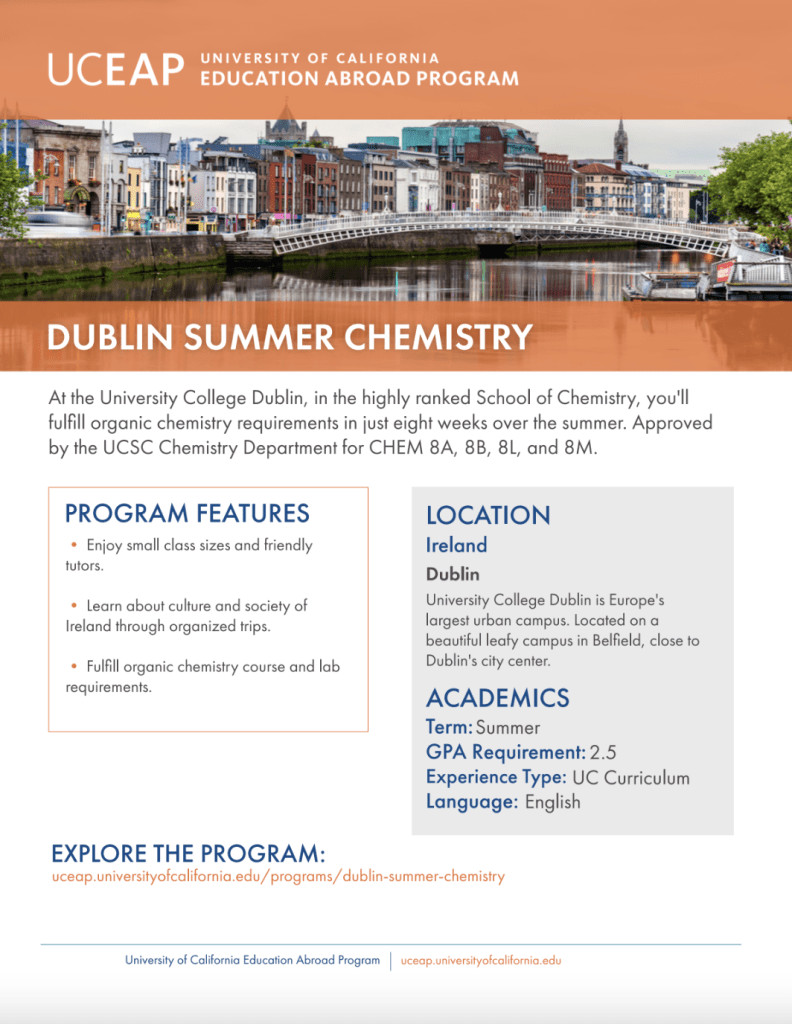
- Graduate Program Recruitment & Information Events/Workshops
The Graduate Program Recruitment & Information Events/Workshops document includes a continuously updated list of upcoming Graduate Program information events, workshops, application deadlines, etc. that the Chemistry & Biochemistry Department has been asked to advertise and that may be of interest to current Chemistry & Biochemistry undergraduates that are considering or pursuing graduate school.
Internships/Extracurricular Experience:
- Career Success’ Job Application Assistance (resume and cover letter feedback)
- Current Internship/Job Opportunities
- Environteers – Environmental Volunteer Opportunities in Santa Cruz County
- General Jobs/Internships
- Recommended Fall Course: CHEM 139 – Chemical Problem Solving
- Teach for America
- Teaching Internships with Cal Teach UCSC
- UCSC Career Success’ Extracurricular Experience (mostly pre-health)
- Undergraduate Research Opportunities
Gil Carpenter – Spring 2023 Spotlight
Chemistry BS Major
Tell us about yourself!
My name is Gil Carpenter, I am majoring in chemistry and I go to UC Santa Cruz. I grew up in San Diego and made the move to Santa Cruz in 2019 for my freshman year. I love to surf, and Santa Cruz has more than enough to offer. Many world class waves reside here with a beautiful coastline to match, it’s like surfing in Hawaii with cold water. I also climb quite a bit at the Pacific Edge climbing gym, which I can’t recommend enough to anyone that wants to pick up a sport that welcomes everyone that enters their doors.
Tell us a bit about your undergraduate STEM experience…Has there been a highlight? If so, what?
My undergraduate experience has been quite interesting with the onset of COVID during my freshman year. It was difficult to find motivation at times when I was distanced from the university, even though I lived off campus for my 2nd and 3rd years in Santa Cruz, not being in person takes a toll on what one perceives as the college experience versus what you really experience during that time. Looking back, I now appreciate the challenge this presented since it pushed me to become the person I am today. During this time, I was trying to become a student researcher at a laboratory on campus, but due to COVID it was difficult to find a position that aligned with what I am passionate about. This all culminated into the highlight of my academic career, my entrance in the Ayzner Research Group which studies the prospect of designing a soft materials scaffold to facilitate the harvesting of light with environmentally friendly materials. This was single handedly the most exciting moment of my career, and it is where I have learned the most about both chemistry and how to problem solve at a higher level.
What inspired you to pursue an undergraduate degree in Chemistry? What do you want to do with your degree?
My love for science and especially chemistry happened when I was in kindergarten. I was watching the show “Mythbusters”, where they use science and engineering to come to a conclusion about a myth, determining whether it was confirmed, plausible, or busted. I looked up to Adam Savage and Jamie Hyneman, and their ability to solve these complex, funny problems that were presented. The show taught me that I wanted to understand the world around me and to solve problems in new creative ways. When I was younger, this came in the form of asking “why” to almost every statement made to me.
What are your goals/plans for the future?
My goals for the future are to go to graduate school for physical chemistry or nanoengineering. I’d like to use this degree to work on superconducting materials, and to develop them so that we can use these materials at higher temperatures, allowing for high efficiency energy transport, energy storage, and magnetic materials. Our world is in need of better electronic materials to push the envelope in different areas of science, and I want to be on the forefront of this push.
Do you have any advice for other Chemistry/Biochemistry undergraduates?
The best advice that I can give to any undergraduate is to pursue a position in a research laboratory. In the year that I have been a part of the Ayzner Group, I have learned more than I could have ever possibly hoped for in my four years here. It has pushed me to be more inquisitive, creatively solve problems, and to appreciate the input of everyone around you. The earlier someone joins a laboratory, the more time it gives one to become comfortable asking questions, solving problems, and debating about different scientific avenues to go down, which is not a trivial thing to learn. The best part of this experience is the advice I’ve received from my mentor, Levi Matsushima, my PI, Alex Ayzner, and the rest of the graduate students – Rachel Richards, Ivette Mora, Matt Bitner, and Jameson Spence – they all have helped me along the way of my scientific journey and I cannot imagine a time without their words of encouragement.
The last thing I’ll say is to enjoy the time you have here in Santa Cruz, make the most of this experience as you will not have another like it. It is a place like no other and I have met some of the best people in my life here.
Lakota Amore – Spring 2023 Spotlight
Tell us about yourself!
I am a fourth year chemistry student, and I transferred to UCSC from Santa Rosa Junior College for Fall 2021. I am from Sebastopol, CA, and I enjoy reading, hiking, and good food.
Tell us a bit about your undergraduate STEM experience…Has there been a highlight? If so, what?
The highlight of my undergraduate experience has been getting involved in a research lab. I am involved in the Wang lab where I have learned computational chemistry and I have been researching the crystal structure of the antiviral drug Ritonavir. This has been very rewarding, and I have learned a lot through doing so. I have enjoyed learning computational chemistry as it is a very useful subject and it has many applications in chemistry.
Are there any specific challenges you’ve overcome that you’d like to feature?
Prior to UCSC I studied biology at community college, and while taking the organic chemistry series became very interested in chemistry. After I was accepted to UCSC I switched my major from Biology to Chemistry for a few different reasons. I really enjoyed the chemistry labs that I had taken and I realized that I would be interested in doing chemistry as a career. I really enjoy studying chemistry because it ties so many fields of science together, such as mathematics, physics and biology.
What inspired you to pursue an undergraduate degree in Chemistry? What do you want to do with your degree?
I would like to study organometallic catalysts to develop more efficient synthetic methods using common metals.
What are your goals/plans for the future?
I want to get a job in chemistry after I graduate, and I will also be applying to PhD programs next fall. I would like to incorporate my experience in computational chemistry into whatever research I get involved with. I am excited to put what I have learned to use and to further the field of chemistry through research.
Do you have any advice for other Chemistry/Biochemistry undergraduates?
My advice would be to get involved with a research lab sooner than later, especially if you want to go to grad school or if you want to see if chemistry research is a good fit for you. I joined a lab during the beginning of my senior year and it has been a great experience, but I wish I had joined earlier.
Sachiko Correa – Winter 2023 Spotlight
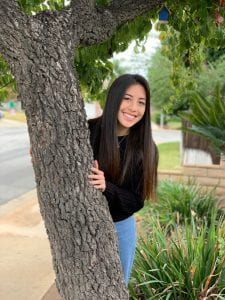 Chemistry BA Major
Chemistry BA Major
Tell us about yourself!
My name is Sachiko Correa and I am a fourth year pre-pharmacy student here at UCSC. I am affiliated with Rachel Carson College and I am the captain of UCSC’s NCAA dive team. When I’m not in the pool, at the gym, or in lab, I enjoy taking care of my expansive houseplant collection and spending time at the beach.
Tell us a bit about your undergraduate STEM experience…Has there been a highlight? If so, what?
The highlight of my undergraduate STEM experience was taking CHEM 1B during the spring quarter of my freshman year. Back then, I was a marine biology major and classes were completely remote for the first time due to COVID. I spent most of my time studying in the absence of social activity and enjoyed learning about quantum molecular theory so much that I switched my major to chemistry. It was a groundbreaking moment to find a subject I was passionate enough about to pursue a degree in.
Are there any specific challenges you’ve overcome that you’d like to feature?
As a freshman majoring in marine biology, I misguidedly assumed that the MATH 19 series was the last time I would see calculus, therefore, I did not devote as much time and effort to the classes as I should have. Consequently, I struggled to keep up in MATH 22 and some of the calculus-based upper division chemistry courses, but with enough hard work and determination, I have been able to pass every class taken thus far.
What inspired you to pursue an undergraduate degree in Chemistry? What do you want to do with your degree?
After switching my major, I took my first organic chemistry courses and was enthralled by the subject. Many of the concepts being taught were related to drug mechanisms and syntheses, some of which pertained to the medications I was taking for ADHD. Three of my housemates at the time also had ADHD and I enjoyed explaining the chemical mechanisms of our prescriptions in a way they could understand. Through research, I discovered that I could use my degree in chemistry as a foundation to practice this hobby professionally as a pharmacist.
What are your goals/plans for the future?
I am currently in the process of applying to pharmacy school in order to obtain a PharmD. Becoming a pharmacist will allow me to use my knowledge of chemistry to provide counsel on the safe and effective use of drugs to improve the health and well-being of patients in need.
Do you have any advice for other Chemistry/Biochemistry undergraduates?
Don’t be afraid to ask for help. As a student at UCSC, you have access to an extraordinary network of faculty members who are more than willing to offer guidance and advice. When I was contemplating switching my major, I emailed many current and retired chemistry professors to ask for their input on my decision, and all the replies I received were filled with enthusiasm and encouragement. Also, don’t be afraid to pursue novel interests! I wouldn’t have discovered my love of organic chemistry and my passion to become a pharmacist if I hadn’t taken a leap of faith and changed my major to chemistry. Best wishes!
Cambell Conour – Fall 2022 Spotlight
Tell us about yourself !
I am a fourth year Chemistry major from Oakland, California. When I make it out of the lab I like to spend my time at the gym, watching movies with my friends, and taking a lot of naps!
Tell us a bit about your undergraduate STEM experience…Has there been a highlight? If so, what? Are there any specific challenges you’ve overcome that you’d like to feature?
There have been a lot of highlights, but I think I am most proud of my lead author paper that is currently under review by Inorg. Chem.! The process was definitely frustrating and overwhelming at times, but it was such a rewarding experience to be able to transform my questions into experiments and the resulting data into a paper.
I am not sure that this is something I have overcome yet, but mental health is always something I struggle with (as I know is the case for many fellow undergrads). These days I am trying to work on taking care of myself and being proud of what I have accomplished so far! I think it can be helpful for people dealing with mental health issues to know that you are not alone and there are a ton of resources both on and off campus that can help!
What inspired you to pursue an undergraduate degree in Chemistry?
I think Chemistry is incredible because it has the potential to do anything–limited only by imagination and determination! Chemistry provides a toolkit of knowledge for people to address some of the greatest challenges of our time. I am particularly interested in using Chemistry to develop clean energy sources and to convert greenhouse gasses into value-added products through catalysis and small molecule activation.
What are your goals/plans for the future?
After graduating from UCSC, I am planning on getting a PhD in Chemistry! I am not too sure of where I will be headed after that, but I would like to go wherever I feel I can make the greatest impact.
Do you have any advice for other Chemistry/Biochemistry undergraduates?
My advice would be to dive head first into undergraduate research! Not only has my participation in research provided me with a ton of great opportunities, but it has also allowed me to get a better understanding of what I am actually passionate about within the huge field of Chemistry. Plus, I have gotten to meet a lot of great people along the way.
Gabriel Gilman – Spring 2022 Spotlight
Chemistry BS Major
Tell us about yourself!
My name is Gabriel Gilman, and I am a fourth year Chemistry B.S. major. I am originally from Riverside, California and am the 5th out of 6 kids! In my free time I love playing soccer and racing with the Triathlon Club here at UC Santa Cruz.
Tell us a bit about your undergraduate STEM experience.
When I came to UCSC I was unsure of what major I wanted to go into so I took a few different intro STEM classes. I proceeded to fall in love with chemistry after being inspired by Professor Alegra Eroy-Reveles in her Chem 1A class. While other majors (physics and biology being the main two) were interesting, the more chemistry classes I took the more excited I got. All of my peers inspire me every day to try my hardest, and I am so thankful for all the friends I have made in the different STEM classes I have taken.
What inspired you to pursue an undergraduate degree in Chemistry?
When I came into UCSC I didn’t have a specific major in mind, but I knew I wanted to pursue a science degree because of my intense curiosity. When I took Chem 1A with Professor Eroy-Reveles I knew that chemistry was the degree for me. Since then I have taken many different chemistry classes with each one causing me to become more excited and fascinated with the field of chemistry. I plan to use this love of chemistry along with my innate curiosity to help bring people justice through the use of forensics.
Has there been a highlight during your undergraduate experience at UCSC?
A couple of the main highlights from my last 4 years here have been researching in the Ayzner lab and being a TA for Chem 1C. I have learned a lot about physical chemistry and light harvesting systems through my research, and have always felt supported by the amazing people in the Ayzner lab. I also got the chance to be a TA during my last quarter and loved teaching chemistry students and getting the chance to inspire them in the same way that Professor Alegra Eroy-Reveles inspired me.
Are there any specific challenges you’ve overcome that you’d like to feature?
One of the hardest things about going to university has been dealing with anxiety. I have always dealt with anxiety, but it wasn’t until freshman year of college that I realized just how much I struggled. During my freshman year I would constantly get stomach aches and feel like throwing up because of my anxiety. However, once I realized what the problem was, I began working on my mental health. While this is an ongoing battle, I am so thankful to all my friends, study groups, and professors who have helped me through this.
What are your goals/plans for the future?
I have wanted to go into forensics since freshman year of high school. However, since doing research here at UCSC I have found a passion for research and have realized that I want to get my PhD in chemistry. Thus, I am going to work in forensics for a few years so that I know what branch of chemistry I want to go into, get my PhD, and then continue to work in the field of forensics.
Do you have any advice for other Chemistry/Biochemistry undergraduates?
Find a study group! One of the things that got me through some of the toughest classes I’ve ever taken was a study group. I’ve been in a few different study groups over the years, and they are amazing! They have not only helped me through hard classes, but they have also led to some lifelong friendships.
Eris Minckler – Spring 2022 Spotlight
Tell us about yourself!
I grew up in Southern California where I spent my free time doing cross country running, playing marimba & cello, and exploring Los Angeles. I graduated highschool after my sophomore year and began attending Pasadena City College at 16. I was drawn to UC Santa Cruz by the collaborative environment and natural beauty of the campus. I later began as a chemistry transfer student in Fall 2019. Besides studying chemistry, I enjoy hiking, going to the beach, cooking, and playing with my pet rats – Potate, Tot, and Pete.
Tell us a bit about your undergraduate STEM experience.
My undergraduate experience has been unorthodox but extremely rewarding. Strikes, multi day blackouts, Covid-19, a wildfire, and online learning all came about during my time at UCSC, forcing me to adapt to whatever new learning environment I was in that quarter. Fortunately, these experiences didn’t get in the way of meeting the passionate, talented staff, professors, and graduate students who helped me get into research and have supported my journey. Throughout global uncertainty, research has been my happy place and contributing in a meaningful way to the research that Dr. Alexander Ayzner’s lab conducts has been a highlight of my time here. In the year and a half that I have been part of a research lab, I have gone from feeling intimidated in a lab setting to confidently presenting my research and even getting published. Earlier this year, I received the opportunity to work with my mentor and Ph.D. candidate Anna Johnston, along with other labmates, to publish our work titled, Conjugated Polyelectrolyte-Based Complex Fluids as Aqueous Exciton Transport Networks. It’s exhilarating to think about how people from around the world could potentially be reading about and finding excitement from the projects I contributed to.
What inspired you to pursue an undergraduate degree in Chemistry?
I’ve always had a love of science but when I began college I was originally an English journalism major. I enjoyed my GE required chemistry and math classes, so I started taking more and more science classes “just for fun.” My schedule became full of STEM classes and I quickly realized journalism wasn’t for me. Semesters of science courses and active involvement in my community college’s chemistry club revealed my passion for chemistry. I wanted to live out the excitement I used to have working on science fair projects as a kid.
What are your goals/plans for the future?
I enjoy exploring the hidden worlds that are only accessible by microscope. After graduating, I plan on attending a scanning electron microscopy certificate program in order to pursue my goal of becoming a microscopy specialist.
Do you have any advice for other Chemistry/Biochemistry undergraduates?
Be kind to yourself, take advantage of every opportunity that comes your way, and enjoy Santa Cruz! Try to remember that you’re going to college for you and your future, so don’t be afraid to ask questions and put yourself out there to look for opportunities. UCSC has incredible undergraduate support programs and staff that want to see you succeed; you just need to take the first step and reach out. Classes are an important part of college, but finding research opportunities, exploring the campus or downtown, and making friends are invaluable to the college experience. Focus on learning as much as possible, meeting new people, and enjoy your time here, it goes by faster than you think!
Amrinder Bhuller – Winter 2022 Spotlight
Chemistry BS Major
Tell us about yourself!
My name is Amrinder Bhuller, and I am a 4th-year studying Chemistry. I am from a small town near Fresno, and living in Santa Cruz has been nothing short of an elating experience. Apart from being in the lab, I enjoy video games, music, watching shows, and reading.
Tell us a bit about your undergraduate STEM experience.
The past four years have been full of wonderful and unforgettable experiences with tremendous opportunities to grow and learn as an individual. Although COVID-19 limited the in-person experience, I met and interacted with excellent professors and students through zoom and online platforms. Being confined indoors, I strengthened my relationships with my family and friends while also having more time for academics.
A highlight in my undergraduate STEM experience was joining Shaowei Chen’s research lab at the end of my freshmen year. I have been researching in his lab since the summer of 2019. Reading literature papers and conducting experiments in a research environment is a unique opportunity that I hope all undergraduate chemistry and biochemistry students experience. I was able to work with amazing mentors and fellow students and had an overwhelmingly positive experience in the research lab. I discovered my passion for nanomaterials and am excited to pursue an advanced degree in the field.
As a first-generation college student in STEM, it felt like a massive burden on my shoulders. The combination of class difficulty and tremendous stress to uphold my family’s expectations made academics a strict priority in my undergraduate career. During these four years, I discovered something I never knew about myself: the ability to strive under immense pressure. I enjoyed my undergraduate career while maintaining and exceeding my family’s expectations.
What inspired you to pursue an undergraduate degree in Chemistry?
My inspiration for chemistry first came from my high school chemistry teacher. She taught chemistry from a different angle, allowing me to understand and grasp the conceptual aspect of chemistry. I noticed how chemistry played a unique role in everyday life, something many people take for granted. I decided to dive deeper into chemistry by pursuing an undergraduate degree to gain a better understanding of the microscopic aspect.
Since then, I have shifted towards wanting to help the world with sustainable energy. With increased fossil fuel consumption, developing low-cost, renewable energy sources is essential. I want to focus on the process of energy conversion and be a helping hand in synthesizing potential electrocatalysts for water splitting.
What are your goals/plans for the future?
My plan for the future is to pursue a Ph.D. in nanomaterials, and I will be focusing on renewable energy, particularly energy conversion and storage. The ultimate goal is to become a principal instructor and professor at a university.
Do you have any advice for other Chemistry/Biochemistry undergraduates?
With how COVID-19 affected every student, the most important advice I have to give is to believe in yourself. At the end of the day, you are in control of your own career, and only you will work hard to ensure a better future for yourself. There will always be moments when you doubt yourself, but you need to overcome those situations and focus. Everybody can pass any chemistry course, do not sell yourself short.
That being said, I believe that it is imperative to learn the course material conceptually. Sure, it is easier just to memorize organic chemistry reactions rather than understanding them, but this will hurt you in the long run. Taking the time to understand the material will enhance your overall understanding and ensure good grades. Furthermore, try to form good relationships with fellow students and form study groups. Study groups are the best way to bounce ideas off each other, helping one another. Do not feel shy within study groups; everyone is relatively understanding. Understanding the material is more important than worrying about what other students think.
Irene Franco – Fall 2021 Spotlight
Biochemistry and Molecular Biology Major
Tell us about yourself!
I’m Irene, a fourth year student studying Biochemistry and Molecular Biology. I am originally from Los Angeles, but living in Santa Cruz has brought a welcome change of pace to my life. Besides the sciences, I enjoy studying art history as well as creating art myself. When it comes to outdoor activities, I am a fan of stand-up paddle boarding and love to explore and hike the areas surrounding the UCSC campus.
Tell us a bit about your undergraduate STEM experience.
You were nominated partially due to your being awarded the Undergraduate Research in Science & Technology Award in Spring 2021. You should be proud! Tell us more about it (what led to your earning that award, what you plan to do with the award, etc.).
The highlight of my STEM experience is undoubtedly joining the Millhauser Lab. Since my second year, I have been provided support and mentorship from my PI, Glenn Millhauser, and the lab members. I was so excited to get hands-on experience in a real research lab. As I gained more skills and understanding of the techniques we use in this lab, I went from a research assistant to a researcher in my own right. I developed a project idea and conducted my research through the Undergraduate Research in Science & Technology Award. Under the guidance of my current Ph.D. student mentor Fran Pavlovici, I was able to formulate the methods and goals of the project and was chosen to receive the award in Spring 2021. I quickly got to work utilizing the awarded funds during Summer 2021. This project involves crystallizing the prion protein, which turns out to be quite finicky, but my goal is to gain new insights into its interactions with the amyloid beta peptide through X-ray diffraction. Overall I am very grateful for the research experiences that the Millhauser Lab, the Division of Physical and Biological Sciences, and its donors have provided me.
What inspired you to pursue an undergraduate degree in Biochemistry & Molecular Biology?
Coming into the university, I knew I wanted to study biology and life in some form, but I was unsure of which major to choose. I explored the Environmental Studies, Environmental Science, and MCD Biology majors before proposing. What I found is that the scale of Biochemistry is the most intuitive and interesting to me. Instead of the planet or biome-wide systems of Environmental Science, or the smaller systems that make up organisms in MCD Biology, I prefer learning about and studying life at the biomolecular level. I am likely biased due to my membership in the Millhauser Lab, but I find structural biology fascinating. It is also helpful that the fundamental concepts I learned in my study of biochemistry are endlessly applicable in the massive field of biotechnology.
What are your goals/plans for the future?
After graduation, I want to take a little break from my education and start my career in the biotech industry, perhaps in food science! Afterwards, I would like to pursue a Masters in Biochemistry to further build on and specialize my knowledge. What happens beyond this depends on the opportunities and interests I discover along the way.
Ana Paula Kitos Vasconcelos
Chemistry BS with Biochemistry Concentration Major
My name is Ana Paula and I am a 5th year senior studying Chemistry with a concentration in biochemistry. I was born in Australia to Brazilian and Canadian parents and I grew up in the Bay Area. In my free time I enjoy doing acrobatics and aerial art, foraging wild mushrooms and playing music.
Sophia Hollow, Class of 2020-2021
Chemistry BS with Environmental Chemistry Concentration Major
My name is Sophie Hollow and I graduated in March as a chemistry major with a concentration in environmental science. Some of my hobbies include camping, rock climbing, acro-yoga, and spending time with my rescue pup Roo. I grew up in San Diego and return often to spend time with my family.
I took a non-linear approach to my undergraduate career. I transferred schools twice for a total of almost eight years as an undergraduate, during which time I moved from general studies to engineering, then on to biology, before finally landing in chemistry. When I first entered the STEM field, I struggled with imposter syndrome and questioned my place in a largely male dominated field.
Roberto Rivera, Class of 2020-2021
Chemistry BS Major
Josh Marquez, Class of 2022
Chemistry BS with Biochemistry concentration Major
Start by introducing yourself!
My name is Josh Marquez and I’m a fourth year Chemistry major with a concentration in Biochemistry. I am the first openly gay member of my Mexican-American family as well as the first to pursue a degree in STEM. Like any UCSC student I enjoy hiking, music, photography, and film.
Tell us a bit about your undergraduate STEM experience – has there been a highlight? What have you overcome?
As an intersectional minority in STEM, my journey hasn’t always been easy but it has been worth it! Initially, I struggled with impostor syndrome, finances, and finding my community within the realm of science, however, after joining STEM Diversity in the Spring of 2020 and later beginning work in the McKinnie lab I have been met with nothing but support and open arms.
I’m sure everyone can agree that 2020 wasn’t the easiest year for students. Each of us were met with our own trials and tribulations that pushed us to our limits and showed us the true definition of persistence. I personally was evacuated several times from Santa Cruz this year due to the onset of the pandemic, wildfires, and finally after my grandfather passed away from COVID related complications on his 71st birthday. Despite these hurdles, I returned time and time again, determined to persevere through my degree and research project.
What inspired you to pursue an undergraduate degree in Chemistry?
My decision to pursue a degree in chemistry started in high school, though my passion for the subject didn’t fully bloom until I enrolled in organic chemistry my sophomore year at UCSC. After discovering the versatility and practicality of the field I fell in love with the subject and became determined to pursue this discipline to its fullest extent by enrolling in a doctoral program for natural products synthesis and bioorganic chemistry.
What are your goals/plans for the future?
My main goal for the future is to participate in a graduate program to advance the fringes of science while simultaneously advocating for and mentoring underrepresented students that are eager to enter this field of work. Ultimately I hope to teach at the university level and create a program designed to encourage minority participation in STEM.
Allison Browne, Class of 2020
Biochemistry and Molecular Biology Major
Tell us a bit about your undergraduate experience – has there been a highlight?
I have grown and learned a lot over the course of my four years here and am grateful for everyone who has supported me along the way. A highlight of my undergraduate experience was realizing that I really enjoyed the major that I had chosen kind of on a whim and want to pursue biochemistry as a professional career.
What has your experience been like as a woman in STEM? (What have you overcome? Highlights?)
A lot of my friends are also STEM majors and successful in their respective fields which is so encouraging to me to be surrounded by incredible and supportive women lifting each other up.
What inspired you to pursue an undergraduate degree in Biochemistry?
I was a proposed Biology major but soon discovered that I loved chemistry as well and was able to learn about the best of both through Biochemistry. Also after taking the biochemistry series, I realized that I really enjoyed the content and was inspired by my professors and the research they are conducting into DNA and proteins.
Have you faced any challenges being a female in STEM? If so, what were they and how did you overcome them?
Being a mixed race women in STEM I have struggled with Imposter Syndrome, but I have been so fortunate to be surrounded by a lot of ambitious women and people of color and first generation students overcoming obstacles of their own to earn their education and have been so inspired by their journeys and their support. Also I have looked up to my female professors who have been amazing role models for me, showing me what is possible with hard work and passion for the subject.
Do you have any words of advice for other students who may be interested in pursuing this sort of research/major?
A word of advice would be to find a good group of people to study who are also interested in the same things or who are in your major because you will have classes with them all four years. Also take full advantage of the resources available to you like ACE, MSI, and make connections with TAs and professors through office hours because they do really want to help you out. Also get involved! I was part of Crown Student Senate and the Random with a Purpose dance showcase which both gave me a chance to meet so many wonderful people I wouldn’t have met otherwise.
What are your goals/plans for the future?
I am planning to take a year off from school after graduating to pursue a job in biotechnology and later potentially a Masters in Pharmaceutical Chemistry after gaining industry experience.
Kareem Bdeir, Class of 2020
Chemistry BS with Biochemistry concentration Major
My name is Kareem Bdeir and I am a graduating senior majoring in Chemistry with a concentration in Biochemistry. I am a Palestinian American born in San Francisco, CA. Some of my hobbies include cooking and growing and caring for plants.
It’s hard coming up with a defining moment in my undergraduate experience because it has been a journey since day one. I started at UCSC as a Biology major but quickly switched to Biochemistry & Molecular Biology and then eventually to Chemistry with the concentration. It was somewhat unexpected how my undergraduate career managed to shape itself around what I liked. I gained inspiration from great professors and they unknowingly helped me realize that I want to teach chemistry.
Being a first generation student in STEM proved to be as difficult as people said it would be. The rigor of my classes paired with the pressure from my family has made these past four years difficult. Something that I learned about myself, however, is that I strive under pressure.
My current plan is to apply for a graduate program at the end of next year. I will work in research until my program begins in 2021.
Shaneen Britton Acevedo, Class of 2020
Biochemistry and Molecular Biology Major
Tell us a bit about your undergraduate experience – has there been a highlight?
I began college as a Bioengineering major, however, it did not take long for me to realize I loved the chemistry and biology classes more than all others. So I changed my major and became a Biochemistry & Molecular Biology B.S. major. It is still one of the best choices I’ve made. Other great decisions I’ve made in college are to tutor for the classes I had already taken, the material becomes so much clearer when you teach it, so I would encourage everyone to try it.
What has your experience been like as a woman in STEM? (Highlights?)
As a Latina immigrant in STEM, having community has always been crucial for me. Here in Santa Cruz, I am surrounded by supportive people as a part of the EOP, ACE and the MSI community. In my research lab, UC LEADS and the STEM Diversity community, I am continuously encouraged and challenged. Being a part of these communities at UCSC has been a blessing, and I would say they are all the highlights of my experience here as a student. As a minority woman in STEM it was definitely a challenge to pursue a degree where you are not the norm, but having these communities strengthened me to pursue my goals.
What are your goals/plans for the future?
Doing research in the Millhauser Lab opened my eyes to a career path I was unaware of before university. Now my plans for the future are to pursue a Ph.D. in Chemical Biology and continue to practice science beyond that.”


